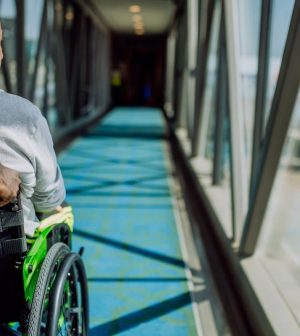- Could Your Grocery Store Meat Be Causing Recurring UTIs?
- Are You Making This Expensive Thermostat Error This Winter?
- Recognizing the Signs of Hypothyroidism
- 10 Strategies to Overcome Insomnia
- Could Artificial Sweeteners Be Aging the Brain Faster?
- Techniques for Soothing Your Nervous System
- Does the Water in Your House Smell Funny? Here’s Why
- Can a Daily Dose of Apple Cider Vinegar Actually Aid Weight Loss?
- 6 Health Beverages That Can Actually Spike Your Blood Sugar
- Treatment Options for Social Anxiety Disorder
Holiday Travel With a Loved One With Dementia: An Expert Offers Tips

WEDNESDAY, Nov. 27, 2024 — Thanksgiving travel is a must for millions of Americans, but those plans will be complicated for some because they’re traveling with a loved one who has Alzheimer’s disease or dementia.
“A family trip to visit a loved one, friend, or favorite destination can be a great way to spend Thanksgiving, including for those affected by Alzheimer’s disease and other dementia-related illnesses,” Jennifer Reeder, director of educational and social services for the Alzheimer’s Foundation of America, said in a news release.
“Whether traveling near or far, there are preparations and adaptations family caregivers can make to help their loved one feel more comfortable and relaxed throughout the trip,” she added.
Some tips to help holiday travel stay focused on family and joy include:
-
Before embarking, family and friends should make sure that their loved one can travel at all, Reeder said. As dementia progresses, travel may become too difficult. It’s worth consulting with their doctor to make sure travel is recommended, based on how long the trip will be and the stage of the person’s illness.
-
If the person can travel, make plans that take their abilities into account. Plan travel to minimize their anxiety and stress — for example, they might travel better at specific times of the day, or travel better by plane or by car.
-
During travel, companions should take steps to make sure the person’s routine is preserved as much as possible. For example, build their normal meal times into the itinerary, as even small changes can be overwhelming and stressful to someone with dementia.
-
Bring items that can help keep the person relaxed and at ease, including snacks, water, activities and comfort items like a blanket, a soft pillow, a favorite sweater or a change of clothing. Don’t forget important documents and a list of their current medications.
-
If traveling by air or train, check in advance about security screening procedures and let the person know what to expect, to reduce potential anxiety. The Transportation Security Administration offers assistance to people with dementia, so contact them at least 72 hours prior to a flight to learn more.
-
If traveling by car, build in regular break times for food, bathroom visits and rest.
SOURCE: Alzheimer’s Foundation of America, news release, Nov. 25, 2024
Copyright © 2026 HealthDay. All rights reserved.










